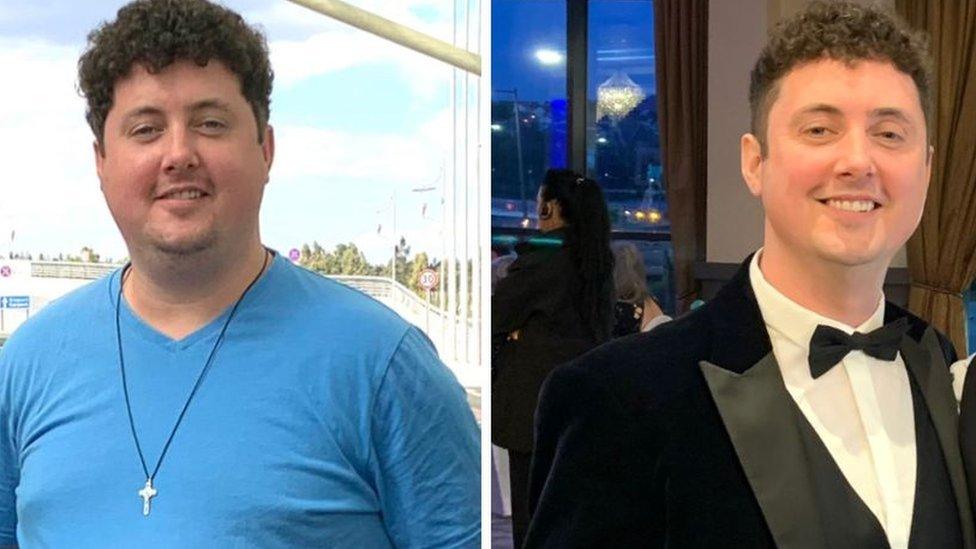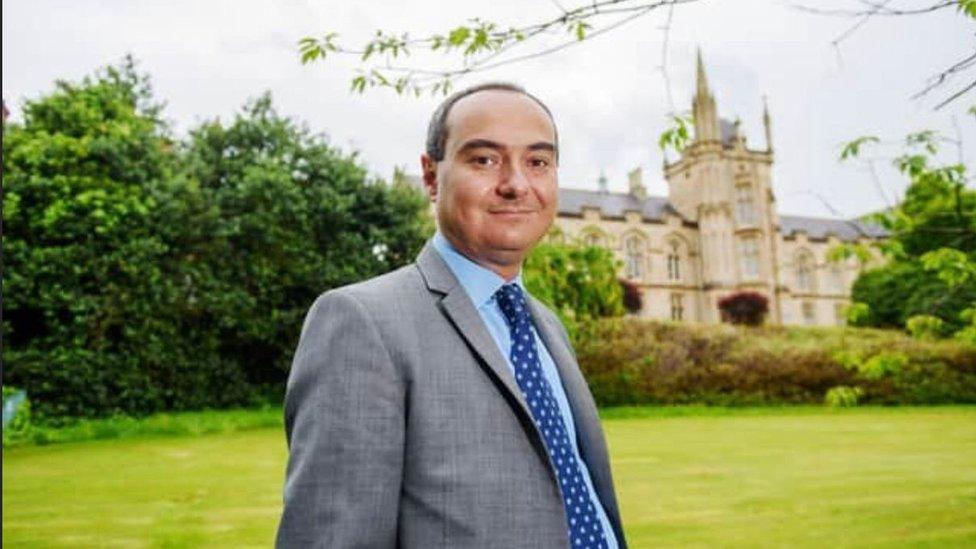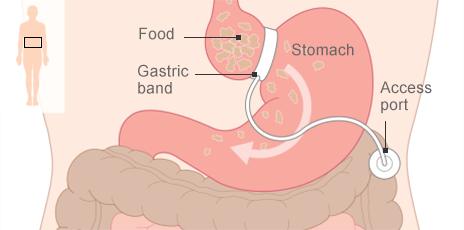Doctor warns about weight-loss operations abroad
- Published

Almost two-thirds of adults in Northern Ireland are classed as overweight or obese
A senior doctor has warned people about the potential dangers of travelling abroad for weight-loss surgery.
Prof Alex Miras, a consultant at Altnagelvin Hospital, Londonderry, said more people were opting for surgeries overseas because of a lack of services in Northern Ireland.
He said he was seeing more people who needed emergency aftercare on return.
"Because more and more people are going, as a result there are more complications," he said.
"The percentage of these complications remains very low.
"Even if those cases are still few, they are very memorable because they can be serious".

'I would have eaten everything and anything'

Derry businessman Joseph McVeigh, 35, flew to Turkey a year ago to have a gastric sleeve fitted.
Since surgery he has lost six and a half stone and is delighted with his new lifestyle.
"Before, I would have eaten everything and anything - hunger woke me up, it was as if you heard a big bang in the street.
"At times I would have woken in the night and ate and would not have remembered it."
His diet was all about "big dinners followed by chocolate and lemonade at night".
The turning point was when he was helping his father who asked him to go up to the attic.
"I genuinely couldn't do it. I was too fat. That really knocked my confidence," he said.
He said he was apprehensive about the surgery, but he had the support of family and friends.
A year on from the surgery, he said he felt fantastic.
"My energy levels are through the roof... I am just oozing with happiness."
He said he had followed the post-surgery regime and changed his lifestyle.
"Now, I can eat anything but I just can't eat a lot. About 80% of that raging hunger is gone.
"I have no regrets, I would do it again tomorrow ."

Almost two-thirds of adults in Northern Ireland are classed as overweight or obese.
Bariatric surgery is not available on the NHS in Northern Ireland.

Prof Alex Miras is treating more people with complications following obesity surgery overseas
"The important thing to say is that most people who go abroad and come back do not have a complication," said Prof Miras, who is also an academic at Ulster University.
"But they need to be followed up for life, for mutational complications, for deficiencies for example different vitamins and minerals, and sometimes even psychological complications but unusual - they need to be followed up."
He said the most common complication was the development of a leak following surgery, which required more surgery.

What is bariatric surgery?

Bariatric surgery, also known as weight-loss surgery, is used as a last resort to treat people who are dangerously obese (having a body mass index of 40 or above or 35 plus other obesity-related health conditions).
Patients must have tried and failed to achieve clinically-beneficial weight loss by all other appropriate non-surgical methods and be fit for surgery.
The two most common types of weight loss surgery are:
Sleeve gastrectomy or gastric bypass, where some of the stomach is removed or the digestive system is re-routed past most of the stomach
Gastric band, where a band is used to reduce the size of the stomach so a smaller amount of food is required to make someone feel full

Prof Miras said anyone considering travelling for weight-loss surgery needed to do their research.
"They need to understand the fact there are potential risks. It is important they travel to a place where they are certain they will receive good care," he said.
"They need to investigate and research it before they make the decision, to choose the country, the surgeon and the hospital where they are going to be operated on.
Prof Miras said he understood why people travelled for surgery.
"That there are no options available in Northern Ireland at present is a fault with the system," he said.
He added he would suggest that people stay at home and look into lifestyle changes, medication or surgery elsewhere in the UK or in the private sector.
There are no official statistics available on the number of people who have travelled abroad for bariatric surgery, including gastric bands and gastric sleeve operations.
The Department of Health said it was looking at ways to collate data on the number of patients who needed emergency aftercare when they return to Northern Ireland in order to understand the scale of the problem.
"A weight management service remains a priority for future service development, but this is dependent on adequate resources being made available," a spokesperson said.
The department is also considering how best to ensure the general population is aware of the associated challenges and risks, including the need to arrange appropriate follow-up care with private providers.
- Published9 May 2019

- Published21 October 2021